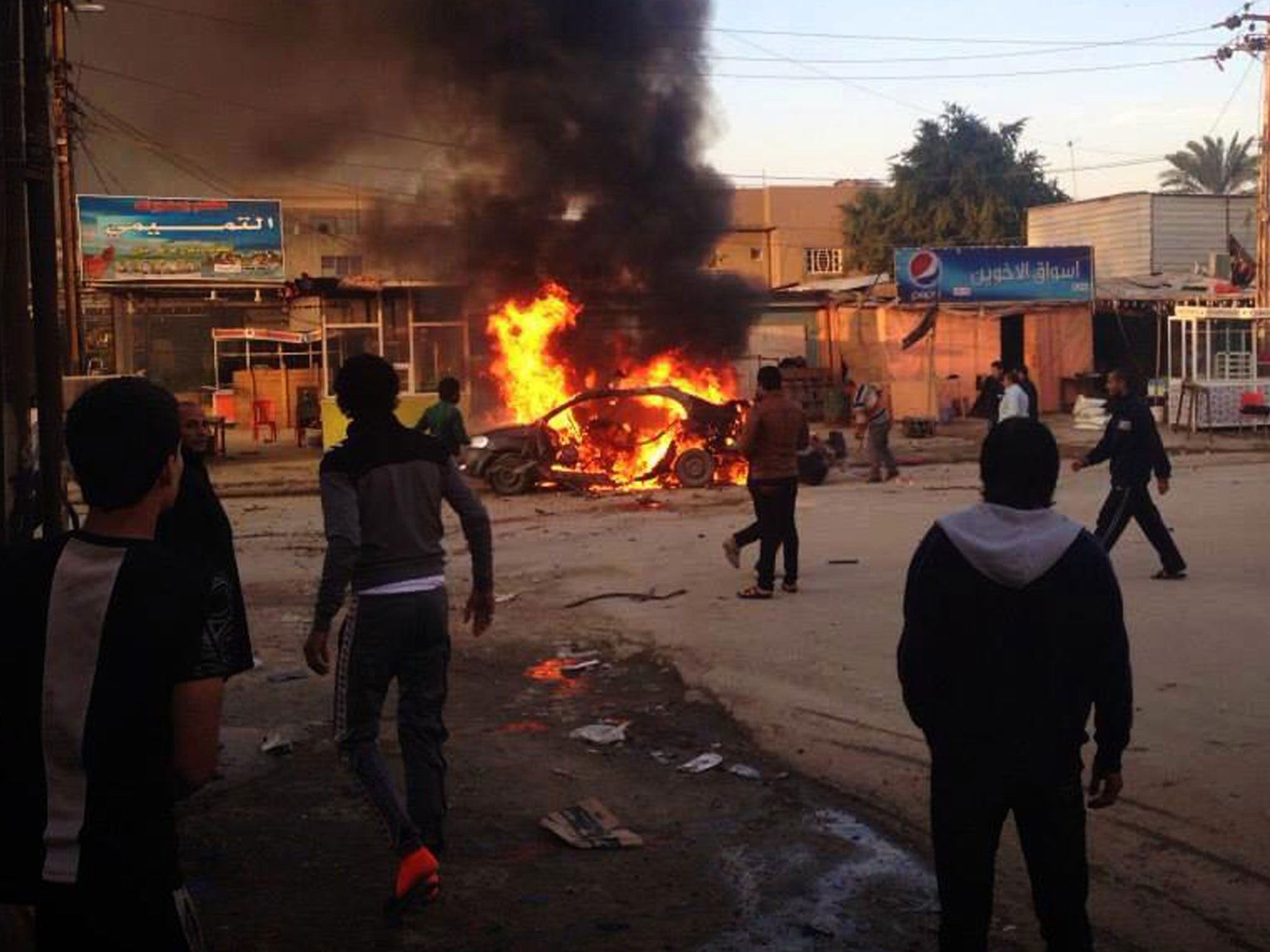Iraqi policeman dies saving pilgrims from suicide bomber as attacks rise
Although five people were killed and 10 wounded, police say the casualties would have been far higher if Ayyub Khalaf had not wrapped his arms around the terrorist to shield others from the blast

An Iraqi policeman is being remembered as a hero after wrapping his arms around a suicide bomber to shield others from the blast.
The attack in Khalis, a town north-east of Baghdad, killed five and wounded 10 people on a Shia pilgrimage, but police said the casualties would have been far higher if Ayyub Khalaf, who was 34 and married with two children, had not given his life to protect them.
"Ayyub was martyred while defending pilgrims," his friend Saad Naim told a news agency. "His name will be an eternal symbol because he saved the lives of dozens of innocents. We will take revenge on [the] al-Qa'ida terrorist organisation."
The bomber was targeting the Arbaeen pilgrimage, in which hundreds of thousands of people walk on foot to the holy city of Kerbala, 55 miles south-west of Baghdad, to commemorate the death of Imam Hussein, the grandson of the Prophet Mohammed. The pilgrims make an easy target as they walk in family group along the roads or congregate in tents to rest or eat. Another suicide bomber killed 14 and wounded 28 when he blew himself up in a crowd of pilgrims in Dora in south Baghdad.
The massacre of pilgrims is the result of a resurgence of sectarian violence in Iraq inflicted by a re-invigorated al-Qa’ida in Iraq organisation, now part of an umbrella group called the Islamic State of Iraq and Syria. Violence has now reached a level not seen since April 2008 with 9,000 people killed so far in 2013, including 595 civilians this month, according to Iraqi Body Count. The victims are mostly Shia. On Wednesday three Pakistani pilgrims were killed and 11 wounded when their bus was machine-gunned between Samarra and Baghdad. And on Monday 82 civilians were killed, 43 of them by bombs in Baghdad and 13 by gunfire in the northern city of Mosul, which is increasingly coming under the control of al-Qa'ida in Iraq.
Al-Qa'ida has grown in strength since extending its reach to Syria in 2012; it now controls significant parts of the country. It can move men and supplies across the Syrian-Iraqi frontier unhindered and has had access to the outside world through Turkey. Al-Qa'ida also has a broad and growing base of sympathisers within the Sunni Arab community in Iraq, which started a protest campaign last December demanding greater political, civil and economic rights. Nouri al-Maliki's government failed to offer adequate concessions and when the army killed 53 protesters at Hawija in April, peaceful demonstrators switched to armed resistance.
Al-Qa'ida in Iraq may now be as strong as it was in 2006, at the height of its power, before the US-led counter-offensive known as "the surge". It mainly targets Shia civilians and Sunni militiamen and tribesmen working with the Baghdad government; these Sunni are known collectively as the Sahwa (Awakening). Today gunmen in military uniform broke into the home of a former member of the Sahwa in Abu Ghraib in west Baghdad and killed him, his wife, his two children and his brother-in-law, according to the police.
Government forces, though numerous, have been unable to halt the rise of al-Qa'ida or to stop the large number of suicide bombers. Their response to the recent growth of al-Qa'ida in Iraq has been fragmentary and often consists of punishing entire Sunni districts, which only increases support for armed resistance. The Pentagon estimated that al-Qa'ida had 800 to 1,000 fighters in Iraq in 2011, but that figure is now believed to be far larger.
Equally serious has been the failure to prevent prison escapes by al-Qa’ida in Iraq militants. On 21 July 500 prisoners were freed after an assault on Abu Ghraib prison. In the course of a year eight attacks took place on prisons, two of which were successful. Al-Qa'ida in Iraq has been able to recruit large numbers of suicide bombers leading to almost one suicide bomb attack a day this summer.
The one optimistic note is that there have been no revenge pogroms against Sunni districts by Shia militias, as happened in 2006-7, but that might change if the suicide bombings continue.
Subscribe to Independent Premium to bookmark this article
Want to bookmark your favourite articles and stories to read or reference later? Start your Independent Premium subscription today.

Join our commenting forum
Join thought-provoking conversations, follow other Independent readers and see their replies